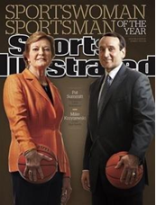Whereas coaching was once viewed as a remedy for an organization’s “problem employees,” today organizations are using coaching to hold onto and improve their very best leaders. But if you are looking for a coach, how do you go about finding the right one? Below are 5 tips to help you select the coach that is right for you:
1. Look for good fit. One of the key ingredients to a successful coaching relationship is the chemistry/fit between the coach and client – ask for a “complimentary session” to help determine the coaches style.
 If you like college basketball, the names Coach K (Duke Blue Devils) and Pat Summit (Tennessee Lady Volunteers) are familiar. They are the two winningest coaches in Division I college basketball history. Both were honored by Sports Illustrated as the Sportsman and Sportswoman of the year in 2011. You may (or may not) be a fan of their respective teams; either way, you can’t argue with their success.
If you like college basketball, the names Coach K (Duke Blue Devils) and Pat Summit (Tennessee Lady Volunteers) are familiar. They are the two winningest coaches in Division I college basketball history. Both were honored by Sports Illustrated as the Sportsman and Sportswoman of the year in 2011. You may (or may not) be a fan of their respective teams; either way, you can’t argue with their success.



